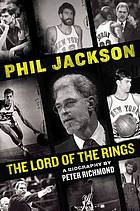
Phil Jackson
Lord of the Rings
کتاب های مرتبط
- اطلاعات
- نقد و بررسی
- دیدگاه کاربران
نقد و بررسی

December 9, 2013
Sports journalist Richmond (Badasses) covers a familiar subject in Jackson, the legendary basketball coach, late of the Chicago Bulls and the Los Angeles Lakers, and no shrinking violet. Just this year, Jackson released yet another self-penned reflection, Eleven Rings. Though Jackson declined to participate for this book, that is hardly an obstacle for Richmond, who covers Jackson’s path from God-fearing North Dakota schoolboy athlete (his father, Charles, was an ordained Pentecostal minister; his mother, Elisabeth, a pastor) to basketball-playing free spirit whose philosophical, people-first approach to the game turned him into the quintessential leader of men. “When you needed to be built up,” says Mark Madsen, who played for Jackson in Los Angeles, “he made you think you could take Mike Tyson and Ali in a boxing match.” Richmond interviews Jackson’s former teammates, longtime friends, and the players he coached, employing an informal, almost folksy style that is both a homage to Jackson’s non-conformist persona and a playful jab at his Zen master reputation. Thankfully for readers, Richmond favors personal evolution over hagiography, which is the difference maker in this in-depth and entertaining work. Photos not seen by PW.

December 15, 2013
Richmond (Badasses: The Legend of Snake, Foo, Dr. Death, and John Madden's Oakland Raiders, 2010, etc.) examines how the legendary coach's search for spiritual truths may have served as the blueprint for his future coaching success. By NBA standards, Jackson was an eccentric. In college, he majored in philosophy, psychology and religion, and he stood apart from his New York Knicks teammates as he referenced Camus and Sartre in interviews with beat reporters. His enlightenment extended throughout his adult life and NBA tenure. Richmond studies Jackson's entire career, including his seasons coaching the Albany Patroons of the Continental Basketball Association, a section that comprises too much of the book. He recounts Jackson's well-known penchant for giving his NBA players reading assignments in an effort to familiarize them with his ideologies and help the 12 dissimilar individuals "coalesce and win." It is worth noting that although Jackson won a record-breaking 11 championship titles with the Chicago Bulls and Los Angeles Lakers, he was named NBA coach of the year only once. Ironically, this may be due to his peers' opinion that his success was not due to his coaching ability; rather, he was lucky to coach superstar players and work alongside equally skilled general managers who created those teams. Ultimately, Richmond strains to represent Jackson's coaching methods as an outgrowth of his personal value system, particularly when he posits that Jackson's famed "triangle offense"--something of a free-form strategy that creates flow within the game and becomes instinctive--mirrors the three components of Buddhist philosophy, as well as Jackson's spiritual belief system, comprised of Christian, Zen and Buddhist doctrines. The book would have been more engaging as an oral history, weaving together stories and observations from Jackson's colleagues, teammates and friends. The narrative ends with the author no closer to validating his premise that Jackson's "Zen thing" has been the key to his success.
COPYRIGHT(2013) Kirkus Reviews, ALL RIGHTS RESERVED.

December 15, 2013
Phil Jackson is the most successful coach in professional sports history. He won six NBA championships with the Chicago Bulls and another five with the Los Angeles Lakers. And he was a player on two New York Knick championship teams in the early seventies. Veteran sports journalist Richmond calls this a biography, but it's really more of a questRichmond in search of the real Phil Jackson, a fascinating man who has remained a bit of a mystery despite a penchant for writing books about himself and his career (four to date). Richmond spent a lot of time with those four books, but he also interviewed former players, friends, and associates in an attempt to get a sense of the man as well as the coach. Phil the Coach has been remarkably consistent in his methods and interaction with his players, who all revere him. The enigmatic Phil has been the public Philhippie, coach, husband, teacher, seeker, friend, and father. Sometimes the contexts overlap. But inarguably, he's a fascinating subject, and while Richmond may not plumb Jackson's depths completely, he makes a reasonably good dive in that direction.(Reprinted with permission of Booklist, copyright 2013, American Library Association.)

























دیدگاه کاربران